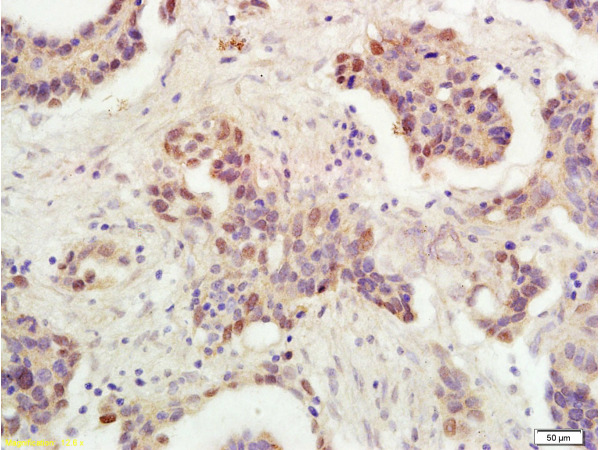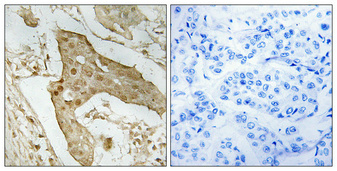p53 antibody [Pab240]
GTX70218
ApplicationsFlow Cytometry, ImmunoFluorescence, ImmunoPrecipitation, Western Blot, ELISA, ImmunoCytoChemistry, ImmunoHistoChemistry, ImmunoHistoChemistry Frozen, ImmunoHistoChemistry Paraffin
Product group Antibodies
ReactivityFeline, Human, Mouse
TargetTP53
Overview
- SupplierGeneTex
- Product Namep53 antibody [Pab240]
- Delivery Days Customer9
- Application Supplier NoteFor IHC: Use at a dilution of 1:250 - 1:500. Extensive washing may be necessary. This product does not require protein digestion or microwave antigen retrieval prior to staining. For IP: Use at 10microg/mg of lysate. By immunoprecipitation, this antibody reacts with only MUTANT p53protein under NON-DENATURING conditions. For WB: Use at a dilution of 1:2,000. Predicted molecular weight: 53 kDa. Optimal dilutions/concentrations should be determined by the researcher.
- ApplicationsFlow Cytometry, ImmunoFluorescence, ImmunoPrecipitation, Western Blot, ELISA, ImmunoCytoChemistry, ImmunoHistoChemistry, ImmunoHistoChemistry Frozen, ImmunoHistoChemistry Paraffin
- CertificationResearch Use Only
- ClonalityMonoclonal
- Clone IDPab240
- Concentration2 mg/ml
- ConjugateUnconjugated
- Gene ID7157
- Target nameTP53
- Target descriptiontumor protein p53
- Target synonymsBCC7, BMFS5, LFS1, P53, TRP53, cellular tumor antigen p53, antigen NY-CO-13, mutant tumor protein 53, phosphoprotein p53, transformation-related protein 53, tumor protein 53, tumor supressor p53
- HostMouse
- IsotypeIgG1
- Protein IDP04637
- Protein NameCellular tumor antigen p53
- Scientific DescriptionThis gene encodes a tumor suppressor protein containing transcriptional activation, DNA binding, and oligomerization domains. The encoded protein responds to diverse cellular stresses to regulate expression of target genes, thereby inducing cell cycle arrest, apoptosis, senescence, DNA repair, or changes in metabolism. Mutations in this gene are associated with a variety of human cancers, including hereditary cancers such as Li-Fraumeni syndrome. Alternative splicing of this gene and the use of alternate promoters result in multiple transcript variants and isoforms. Additional isoforms have also been shown to result from the use of alternate translation initiation codons from identical transcript variants (PMIDs: 12032546, 20937277). [provided by RefSeq, Dec 2016]
- ReactivityFeline, Human, Mouse
- Storage Instruction-20°C or -80°C,2°C to 8°C
- UNSPSC12352203
References
- Park D, Lee JH, Yoon SP. Anti-cancer effects of fenbendazole on 5-fluorouracil-resistant colorectal cancer cells. Korean J Physiol Pharmacol. 2022,26(5):377-387. doi: 10.4196/kjpp.2022.26.5.377Read this paper
- Kim JW, Kim SH, Mariappan R, et al. Anti-cancer effects of the aqueous extract of Orostachys japonica A. Berger on 5-fluorouracil-resistant colorectal cancer via MAPK signalling pathways in vitro and in vivo. J Ethnopharmacol. 2021,280:114412. doi: 10.1016/j.jep.2021.114412Read this paper
- Moon D, Kim J. Cyclosporin A aggravates hydrogen peroxide-induced cell death in kidney proximal tubule epithelial cells. Anat Cell Biol. 2019,52(3):312-323. doi: 10.5115/acb.18.192Read this paper
- Tien YT, Chang MH, Chu PY, et al. Downregulation of the KLF4 transcription factor inhibits the proliferation and migration of canine mammary tumor cells. Vet J. 2015,205(2):244-53. doi: 10.1016/j.tvjl.2014.12.031Read this paper







![ICC/IF analysis of HeLa cells treated with 100 nM Doxorubicin for 24 hrs using GTX00675 p53 (Acetyl Lys120) antibody [10E5]. Red : Primary antibody Green : DAPI Dilution : 1:1000 Fixation : 4% PFA, overnight Permeabilization : 0.25% Triton X-100 in PBS for 10 min](https://www.genetex.com/upload/website/prouct_img/normal/GTX00675/GTX00675_20191104_ICC-IF_w_23053121_863.webp)